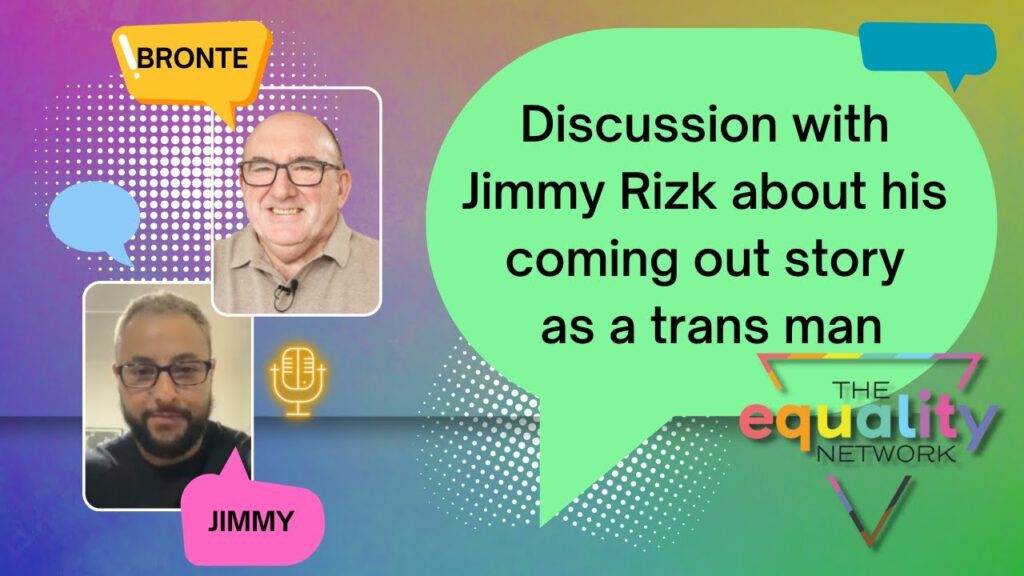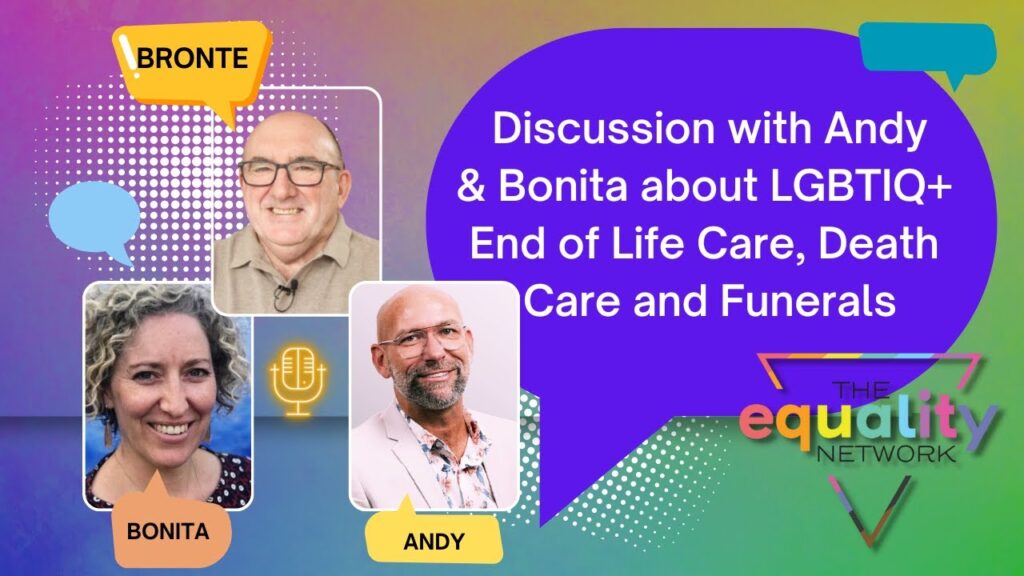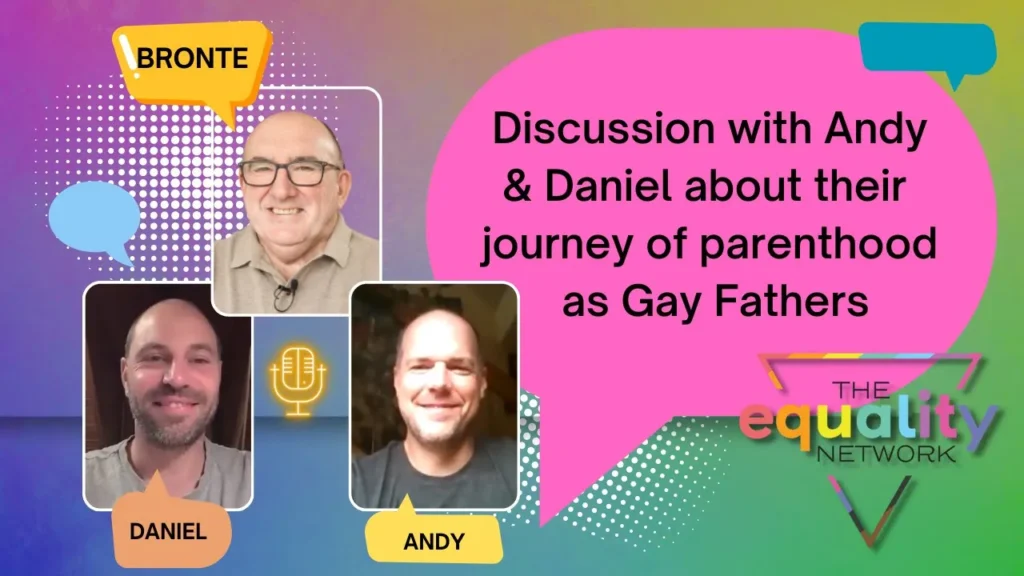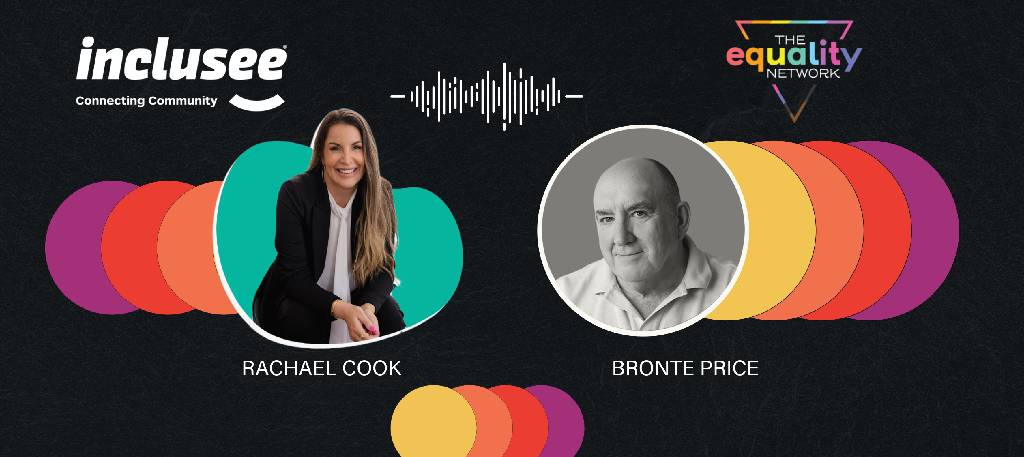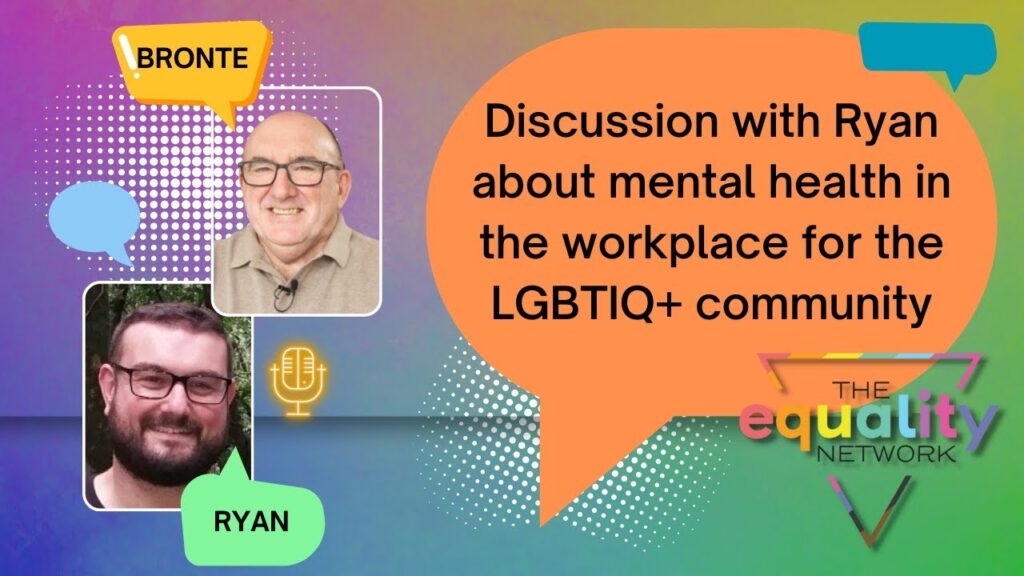Life’s milestones – are they different for LGBTIQA+ people?
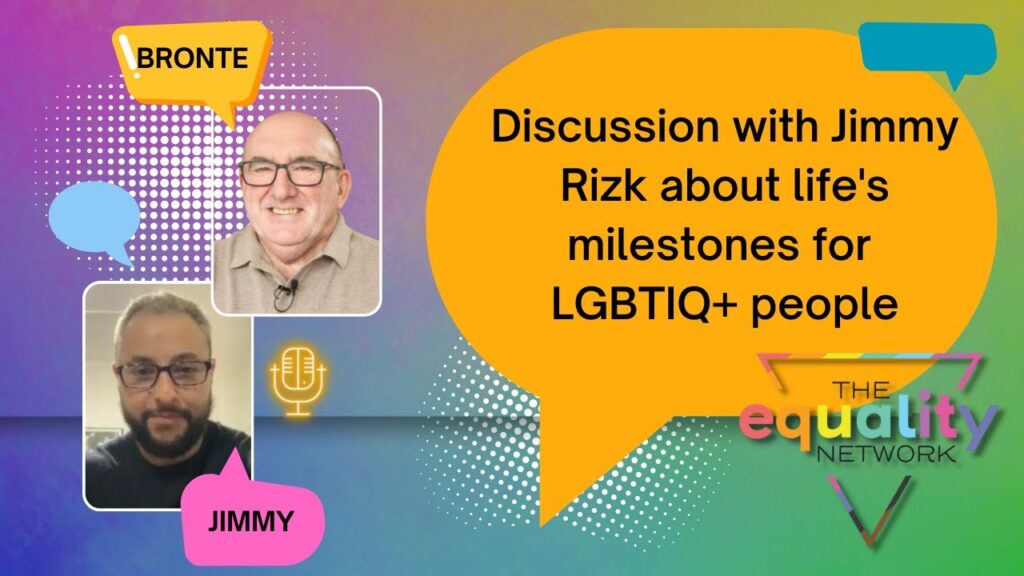
Many of us cruise through life smoothly, without thinking about the milestones that we pass on our way. Life just happens! But for many members of the LGBTIQA+ community, life’s not smooth. And those milestones can be large boulders that we have to climb over or take a longer journey around. This webinar explores how the milestones in two phases of our lives can be different for LGBTIQA+ people from the experiences of cis het people.
The interview meanders across the following discussion areas:
- Undergo marked physical changes
- First day at high school
- First romance
- Learn to play a musical instrument or a new language
- Get driver’s licence
- Buy first car
- Get first part-time job
- Have first kiss
- Have first sexual experience
- Go on first date
- Experiment with drugs and alcohol
- Staying at home or moving out
- Conflict with parents
- Development of close friendships
- Playing team sports
- Exerting increasing independence
- Learning responsibility for actions
- Keeping up with fashion and music trends
- Fitting in with peers – working out own identity
- Starting university / college / vocational education and training
- Get married
- Alcohol and drug use
- Career progression
- First loan
- Buy first house
- Renting a house with others
- Have children
- Raise children
- Maintenance of friendships
- Divorce / relationship breakdown
- Children’s illness
- Experience loss of job
- Potential involvement in crime
- Working out what intimacy means Vs isolation and loneliness
- Community service via community groups
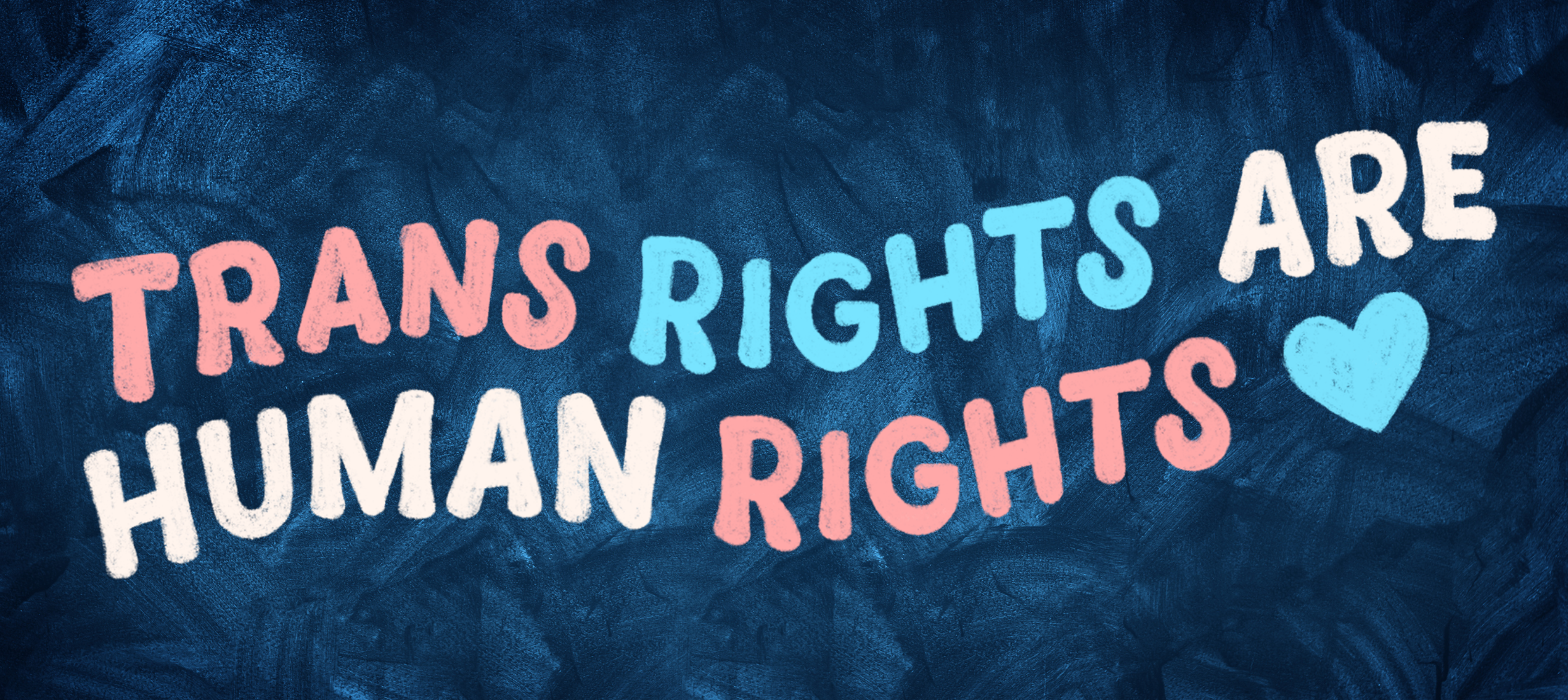
The detailed transcript for the entire discussion is as follows:
Bronte: Hi! My name is Bronte Price. I’m the founder of The Equality Network and welcome to another safe space chat. Today I’m joined by Jimmy, a trans man and for many of us we cruise through life pretty smoothly.
We don’t really think about the milestones that confront us at different phases of our life and for many of us life just happens.
But for many members of the LGBTIQA+ community, life and those phases isn’t quite so smooth. Sometimes those milestones can be like big boulders, that they’ve either got to travel around or climb over the top of.
So this safe space chat explores how some of those milestones in a couple of phases of our lives can be different or pretty much the same for LGBTIQA+ people as for cis-hetero people.
So Jimmy let’s start by just having a broad conversation about that phase of Life called Early Childhood. What was it like for you as Jimmy?
Jimmy: I feel like um… yeah! I always felt quite different to the majority of other kids as a young person. And I think I never really dug too deep into it. I mean maybe now that I’m talking about it I’m kind of reflecting on the fly. But, yeah I did feel like it was hard for me to relate to a lot of other kids my age.
I would kind of watch them and see how they just kind of fit into their little… I don’t know… niche little neat parcels I guess and I’ll be like why do I feel like I’m kind of a big mishmash of random things. So I actually struggled to make friends… kind of… in the first few years of primary school and I think that’s when I really noticed that I wasn’t one of the girls.
So I used to avoid hanging out with the girls and I would go play with the boys. And it was really interesting because it was actually the other kids in kindergarten who would treat me like one of the boys. Yeah, so when we played like kiss and catch I was never on the girls team I was always on the boys team. So I don’t know… I was kind of cool I guess.
But um yeah so I felt definitely different but like I was mentioning to you before, that something I always noticed in my early childhood that didn’t seem like it was happening to everybody else… I would get really really distressed about being put in like feminine clothing and then on top of that if my mum wanted to take photos of me or whatever I would just have this full-on meltdown and I just couldn’t handle it.
And right up until very recently I’ve always really struggled to have my photo taken because I never felt like it reflected who I truly was. And I think another thing was looking in my reflection um I would always be so surprised by what I saw when I’d look in the mirror because in my mind’s eye I think I always look like some version of this.
Yeah and so I’d look in the mirror and be like oh! like it was really jarring for me.
Bronte: That was of course several times a day or at least the daily occurrence you know as you brush your teeth or do your hair I guess.
Jimmy: Yeah absolutely. And I think like as such a young person to be so fixated on the way that I looked. I don’t… like I know kids these days can be quite self-conscious and all. But like I was very very fixated on it and I felt like physically repulsive. I always felt so hideous as a young kid, so I don’t know if that would reflect the majority of cis (gender) people.
Bronte: Okay and was there any response around that by any of your teachers say in primary school or later primary school?
Jimmy: In regards to what aspect?
Bronte: Yeah this aspect of you feeling like you didn’t fit in that you were more of a boy than you ever were of a girl and their response to that.
Jimmy: I don’t remember the teachers ever having too much to say to me about it I think I was always um I was never a kid that was like suffering and feeling isolated and not knowing how to give myself what I need. I think I was always an outlier but a very independent strong outlier.
So I don’t think that there was like concern for me by my teachers or my parents. I was always just a little bit left of center like that’s just how I’ve always been.
Yeah but I do remember that the kids in my year, would ask me like – are you gonna get a sex change? And I remember saying I don’t know… you know… like I just always I just felt this way and I think at least my contemporaries could see it and feel it. I don’t know whether the adults around me could or not.
Bronte: And that’s just how kids are isn’t it? Just so straight to the core and just ask those questions because they’re… There’s no malice behind that.
Jimmy: It’s simply no curiosity!
Bronte: So let’s talk about teenage like and we’re going to talk about a range of milestones that most kids would kind of go through hit as you go through teenage and then early 20s. And so that’s the kind of area of life phase of life that we’d like to look at I think.
So sometime in the first few years of teenage we typically go through some pretty marked physical changes. Obvious and you know known to every person who’s ever been through teenage yeah occur for you in a similar way do you think but it would for a cis (gender) person or was it pretty different?
Jimmy: I did feel quite distressed about going through puberty. For me it happened really young. I was in primary school so I got my period I think in year 5. And like I was just like no no no no no no no this cannot be happening to me like I just I hated it. And I felt like it was shameful and disgusting and it really bothered me and then you know like growing breasts and everything.
That really got I did not like that at all because that was something that was… you know visual for everybody else to see. At least with like having a period, it was just I knew. Yeah you know um but I think I was always worried about how other people were perceiving me.
And it was changes that were outside of my control like that I really didn’t want. Yeah um so it was a combination of it making me feel dysphoric but also because I was like quite young and nobody else around me was experiencing it I was like oh like I did I didn’t like it at all.
I don’t know if other people get excited by it.
For me it was just I guess it was one of those first moments where I really started to see like boys and girls and separating. You know because as young kids we kind of all just whatever we’re a little bit genderless I feel.
But this is where things started to kind of really take a detour from what I saw for myself.
Bronte: The first markers aren’t they of gender? what you know to be how is the first day at high school for you were there any changes to you between primary school whereas you said kids are kids. And there’s not much kind of kids don’t see difference in that way. They don’t see differences in colour for example or race, so just wonder if that changed when you got to high school?
Jimmy: For the first few years of high school, I think by that point I had really taken note that of what the majority of other girls were doing. So I think I actually flew under the radar a bit because like I said I’ve always been really concerned with how everybody else perceives me.
So I’ve always been very calculated… filtered… edited. I curate this identity that everybody else sees because I don’t want to stick out like a sore thumb. So you know after going through puberty that influenced the kind of clothes that I would wear. So I used to be very androgynous as a young kid and then I was like okay well now I’ve got this body, I don’t want to necessarily be this like really butch looking kind of girl.
So I actually dressed more feminine and I hung around with big groups of girls and they could feel the vibe of me was different I think a lot of girls still responded to me as if I was a boy. And I know that some of them maybe were confused by me because I think people found themselves attracted to me that I couldn’t understand why. And then they would like hide that. And that is not a nice feeling you know. But yeah in general I think for the first few years of high school, actually for all of high school I really kind of tried to conform to what was like within the realms of like “normal” for a teenage girl. At least visually you know.
Bronte: So that involved the usual kind of hit I take the point that you were your presentation, your gender expression was pretty androgynous. But it did it involve kind of experimenting with makeup?
Jimmy: Yeah like I would wear makeup I mean even until my 20s. I had hair like down to here like long wavy hair which didn’t bother me. I really loved having long hair. But yeah like definitely dabbled with the makeup… kind of more around the age of like 16 and up I would start wearing more dresses and you know.
Just quite feminine things and I started getting like a lot of attention from like 16 to like 18-19 from guys and you know and I would entertain that idea, went kind of on a few dates but I was never really that interested. Boys are dumb. But yeah, like I really tried so hard to be a girl.
I think for those years I kind of almost had forgotten a little bit about how I truly felt. Because I was so wrapped up in what I thought I should be. You know I just wanted to feel beautiful. Because I’d never felt beautiful in my whole life and then like I turned like 16 and I because I was quite chubby as a kid and as a teenager. But when I turned 16, I became vegetarian.
I started losing all this weight. I’d gone through puberty. I looked pretty. So that was like an incentive for me, I was like I feel beautiful only because other people were perceiving me as beautiful.
Bronte: And I guess you’re getting some attraction from the boys as well. Pretty good for the ego right?
Jimmy: Of course! And like to this day I still get a little bit distracted by that sometimes. Because I still get a lot of attention from guys and even though I can’t really see myself dating a man but I still like I don’t know.
It just maybe it’s affirming now because I’m like – if gay guys like me like wow that must be. But yeah so I was always really dependent upon like other people’s perception of me because internally I couldn’t like make myself believe it – that I was beautiful.
Bronte: So you had to rely on others’ interpretation of that and that affirming stuff from them. I want to go to um getting your your first… Did you have a part-time job during teenage?
Jimmy: Yeah! I used to kind of dabble with teaching like tutoring. Like tutor the disadvantaged kids at a local community centre. And I’d teach music but in a very like casual capacity. I’ve actually always really struggled with holding down a job.
I haven’t lasted on any job for I think… (silence). The longest time I had worked in the same place was a few years and that was when I was working with my dad. But apart from that, I just get very anxious and overwhelmed.
Especially when I was transitioning but as a teenager like the first jobs that I had… I think I wasn’t focused too much on my gender presentation at that time like it I think I was just running with the femme thing and so I was just like I was okay like I could do it. But yeah definitely moving beyond then I stopped working completely because I was like – I can’t how can I get a job if I am an in-between freak which and I’m saying that thinking about myself I’m not to call non-binary people.
That but that’s how I felt I was like people aren’t going to know how to talk to me. People will be nervous to engage with me because they don’t know what to say or how to take me. And I hate awkwardness and cringey-ness… you know… I love things to have flow.
Bronte: And so the solution to that at that stage was to just not have a job. Not apply for a job because it was an easier way to proceed right?
Jimmy: Yep and so I was on Centrelink while I was studying. That was hard. I had like no money. I actually had a really beautiful partner at the time, who really financially supported me through those first few years of transition.
And yeah kind of like after a couple of years of social transitioning then I finally landed a job – “teaching” but you know I had to keep like reassessing this is who I am you know and I felt like an idiot because I was like – I’m here standing up in front of a class of toddlers and their parents being like – I’m Jimmy I’m a I’m a male teacher and I just didn’t feel it like I was convincing enough. So to have to do that every week it was just exhausting.
So yeah I just I quit that job too.
Bronte: So, was it a part-time job or a full-time job?
Jimmy: It was only part-time.
Bronte: Yeah, okay so that’s just completely draining I would think on your mental health like every minute of every day that you’re at work you’ve got to go through that struggle I would think. Is that… ?
Jimmy: Oh! it’s exhausting, honestly like and I was struggling really bad with like drugs and alcohol at the time. You know like I just… I don’t know I was a hot mess.
And I don’t think I would let myself feel the enormity of what I was experiencing at the time because I think like I touched on the other week. For me it was like – survive. If I take any time to like reflect and go this is really hard I can’t do it. I was like I’m going to lose my momentum. Just keep going okay if it’s too much – okay not take that one out – keep going, keep going, keep going – find something else that fits better. It was just take a step, take a step.
Bronte: Yeah, so at what age did you start having issues with drugs?
Jimmy: It started when I was around 16. Even now, I have to be really careful with my personal boundaries because I have really bad impulse control. I just got to a point where I realised that I could end up in jail, dead, or even kill somebody else.
So, I had to have a few moments of reckoning with myself. My close friends talked to me and told me that I couldn’t do this. I had damaged and hurt a lot of people in relationships and was constantly sabotaging myself.
It has only been in the last couple of years that things have changed. I didn’t drink alcohol because that was a big issue for me. Alcohol would switch off any common sense in my brain, and that’s when a lot of the bad stuff would happen.
I didn’t drink for three and a half years, but recently I have had a bit of wine every now and then. I have a limit, and I don’t get into trouble anymore. I think my brain is fully developed now that I’m 30,
Bronte: And it’s probably a lot clearer and less foggy.
Jimmy: I have created a stable life for myself, and I learned a lot of hard lessons when I was young. I’m trans, so I think I have the toolkit now to deal with the emotions that still come with it all. I’ve been in therapy for a really long time, but it’s just a choice every day. I choose me and I choose life. I have so much to give to the world, and I have so much that I would love to receive from the world, so I want to be better. I don’t want to settle for a life that’s half lived.
Bronte: And so, from around age 16 onwards for a few years, it sounds like you had a pretty solid support network around you. Is that right, or was it kind of…?
Jimmy: Yeah, I’ve had mostly the same friends since I was around 12. I still live with one of them – I can’t get rid of him.
Some of the boys from one of my high school groups, yeah, a handful of them are like family to me. They’ve seen me through and supported me, and I’ve done the same for them. I think they always turn to me for advice on a lot of things because, I don’t know, I feel like trans people become this big mediator and wise sage for everyone else around them. So yeah.
Bronte: Some other things that happen during teenage years are that we experiment with different groups, go in and out of friendship groups, and it becomes quite competitive and nasty, with all sorts of bullying and stuff that happens. But it sounds like you’ve got this core of really solid friends that you’ve maintained, and I’m still…not, right?
Jimmy: Yeah, I’m super lucky.
Bronte: One of the other things that happens in teenagers is that most of us would still be living at home. One of the hallmarks of being a teenager, I think, is having the occasional fight with the parents. How was that? What happened with you? Did you live at home for much of your teenage years?
Jimmy: I lived with my mum until I was 18.
I was always very cool, calm, and collected, like always wearing a poker face. I really chose my battles with my parents. I always had a deep respect for them, but my mum and I co-parented my younger sister in a way.
So, even though I was very much the child in my mum’s household, I was treated with a certain respect for my ideas, opinions, and beliefs. So, if my mum and I did fight, it was usually from the age of 16 up, and it was about lifestyle choices.
My mum is a very by-the-book Catholic, a perfect Italian, and you can picture it like she’s just very by the book, and I’m really not. I get into trouble a lot, but the extent of the trouble I was getting into was never realised by my parents because I would just live a double life where I was exactly who I needed to be at home to keep things calm and smooth, and then I was a mess everywhere else that was away from my family.
Even now, I don’t like to mix my friends and my family too much because there are drastically different versions of me. I am known for being very spontaneous, impulsive, not thinking of consequences, whereas at home, I would be described as responsible, knowing my sense of obligation to my family, and reliable.
Bronte: compliant perhaps.
Jimmy: I was always a bit in the background, just letting other people have it out and being the mediator. That’s the role I played at home. Okay, so kind of like a chameleon where you are reporting to what’s required in different situations, and you can pick it on and pick it off.
Absolutely, that’s exactly how I would describe myself. It’s a safety thing, right? Because I know who I am and I know my biggest, fullest version of myself, but if it’s not going to be received in the way that I want it to be, you know, this kind of ties in with the trans stuff too, right? It’s like, do I want to fly under the radar here? Yes, I do because it’s safer for me.
I’m not going to get attention put on me. I’m not going to get scrutinised or criticised or all this kind of stuff. So, I’ve always played a bit of a game, you know?
Bronte: So post high school, you finished, and you went right through high school, correct?
Jimmy: Yeah, yeah, yeah.
Bronte: And then you headed to university. Tell me how you found the looser, I guess, freer, more independent vibe that we have associated in our minds, I think, with universities compared with the pretty structured kind of learning, even social learning that goes on at school. How was that for you? And tell us a bit about what you studied at Uni as well.
Jimmy: Sure, so I studied music, so creative, and I also studied education. Um, when I went to uni, I moved out of my mum’s house and moved to Sydney. I lived with my dad, and I don’t really know him that well. So, I was kind of getting to know him as a person.
He was very much like a housemate. I had never been disciplined by my dad ever in my life that I can think of because he just wasn’t around. So, it was like two people just living with each other. He was really depressed, and I would describe him as an alcoholic.
So, he was just drinking every day and passing out on the couch, and I just came and went as I pleased. So, I just turned… I’ve basically been in the world, living with a parent who is completely absent. And I’m going to uni where there’s not that much structure. To be honest, I actually just went off the rails.
I had all of this freedom, all of this awful pain that I was carrying, and I just basically exploded everywhere. Um, I was partying all the time, I wasn’t eating, I became really fixated on starving myself and dropping as much weight as I could.
Um, and my dad’s just not noticing anything because, well, he’s drunk all the time. So, I just had free rein. I just didn’t have the tools to deal with basically being let out to run free in the world. Um, I started failing uni. I never really went. I was always in the counsellor’s office.
Um, I had to go and do a bunch of like, um, are they called black psychiatric assessments, all this kind of stuff. Like I felt like I lost my mind. Like I was so paranoid, and I guess what I would call stress-induced psychosis.
Like, I was hallucinating. I thought people were coming after me. Like, it was a really, really bad time. Um, but at the same time, I was performing like interstate, um, you know, like living a real rock and roll kind of lifestyle. Um, but I was doing really well in my singing because I did classical voice, and I had an amazing teacher.
So, it was like, I’m high-functioning, I’m getting all my work done, but then also, like, not because, oh, now you’re really not making it to uni. Like, you just, you’re not feeding yourself. Like, you know, I would stop showering. I just, it was a mess.
Bronte: So, what happened to turn that around? So, you had all this freedom and independence that you weren’t taking responsibility for. What happened to change all that?
Jimmy: Um, it was a gradual thing over time. Um, I mean, there were just moments, you know, like, I was so far gone, especially in my intimate relationships. I was cheating all the time. Um, and I just, I don’t know, I had no remorse.
I was just, I was like manic all the time. I just, I think it wasn’t registering. And then I remember being at the beach one day, and I just had this really intense moment of, like, if the 10-year-old version of me could see me now, they would be devastated because all I was doing was just hurting people, was hurting people and I was hurting myself.
And like that was a really sobering thought for me. It was like the first time that I really reflected on who I was becoming. I understood that I was this way because of all the things that I was feeling inside.
At the time, I couldn’t fully divulge them even to myself. It was too much for me to handle. But I knew that I was kind of letting myself go down that path. It’s a choice. I don’t want to be that person. I want to bring joy, love, and light into this world. So, I need to make decisions that reflect that.
I need to do things that align with what I value. I had that moment, and then I felt inspired for a bit. I had a new level of consciousness and awareness about it, but I still fell back into my old patterns.
I kept doing it, and even now, I am so much better. I’m really proud of who I am and what I bring to the world and the community. But I still feel like this default where a switch flicks, and I’m just back into this. It almost doesn’t feel like me.
It’s just this person who has so much hurt and just wants to feel it and wants others to feel it. I start using drugs and alcohol again, and I get really hurt. But it’s just little moments along the way that have kind of helped me go, ‘Oh, it’s not worth losing what you have to just sit there in your pain.’ The work that I do with my therapist and my chosen family is kind of key to helping me through those times and to reflect on that switch.
Sometimes, it’s a real personal thing. I’m the kind of person that, even though I’m super social and really bubbly, I’m never in my room. But sometimes, I’m going through those moments, and I just lock myself in my room for like days.
I just stand in front of my mirror, and I talk to myself, and I pray because I was raised with religion. I try to connect to a grounded version of me and feel connected to the world around me because when I start feeling like that, I feel no connection to anything.
It’s easy to do really hurtful things because you can’t feel another person’s feelings or remorse. So, I try to reconnect myself to my belief systems and stuff like that. Definitely, having people there as sounding boards who know me and know what my patterns are like, that is really helpful because I can say the awful things that I’m thinking and feeling and not be judged.
Some of the power gets taken away once it’s out of my mouth. I’m like, ‘Oh, that’s true.’
Bronte: You know, just the fact that actually sharing what’s or saying those words is sometimes enough to help you reflect.
I think you talked earlier about the fact that it was really hard to hold down a paid job for some time, and so you eventually graduated from a community with a degree in music. Is that right?
Bronte: How did you come to own your own business? You’re the boss now, right?
Jimmy: Well, I finished uni and did my pracs in high schools. It was tough because that was pre-medical transition, but I hated the restrictions placed on me in terms of how I could teach. I always had a sense of professionalism, but I’m very relaxed in terms of the way I talk to people.
I like to keep things human and maintain a sense of humanity. I didn’t like the way I had to be stringent and set myself as the authority, with the children beneath me. Even in my pracs, I dealt with a lot of kids who were very inappropriate towards me, and I was still a kid. I had to maintain proper boundaries.
Keeping in mind everything I just told you about drugs, alcohol, impulse control, and all that kind of stuff, I knew I couldn’t be a teacher.
So, that’s when I started working for my dad. It had its own issues, but he supported me through my transition and recovery from surgeries. It was easy to talk to him about it since he knew. We were running an importing and wholesale retail hand tool company, which was very different from anything I’d done before. It exposed me to construction, and we had a lot of tradies that would come in. I stayed there for a few years through my first few years of HRT. I started gaining confidence as I looked more masculine and older. Eventually, my dad wanted to wind things down, and I couldn’t see myself carrying on the business. So, I said I think I’m going to go find a trade.
I looked everywhere to get an apprenticeship as a mature age person, but nobody would take me on. So, I worked as a casual labourer for years for different people. Then, I realized that people were relying on my skill set and paying me as a casual labourer.
Later, I got a phone call from a company CEO that builds granny flats and stuff. She said our values aligned and asked me to work as their site foreman. I said yes because I was getting married, and it was going to be good money. I also had a sense of duty to further my career, although it was never super important to me.
But, I told her I did not want to be super invested in this because I live in Wollongong, and I need to travel a lot if it is in Sydney. Basically, I was saying, “Please don’t steamroll me with your business dreams.” She talked me out of quitting that job multiple times with better conditions and a little bit of extra attention, and that was miserable.
I was working my ass off for somebody else’s dream, and that’s a massive burden to bear. I was the only person who knew her system, and she needed me. Although I felt I wanted to help her, I was at the mercy of her organisational skills and lack of experience in the industry.
Eventually, my relationship broke down, and I went for a walk with one of my zias (auntie), and she asked me what my five-year plan was. I said I wanted to work for myself, be in a long-term relationship, and own a house.
She said, “If you want to work for yourself, why are you working for somebody else?” I realized she was right. I could be doing this by myself because I have the skill set. It’s terrifying because I’m going to have to start from scratch. But, then I quit my job, and I told my boss that no means no.
I stopped responding to her messages, trying to get me back, and took two weeks off. Then, I embarked on this journey that has turned into this crazy successful business. I never thought I would be running a carpentry business with an employee, but it’s been a year, and we’ve already made a profit. Although I don’t like working full-time, I manage to balance my work, and we are more than surviving off what we’re doing.
I’m grateful that so many people have supported my business, including my family, the theatre community, and many others. Since the article in the ABC came out, I’ve got a lot of business from that and local recognition.
I’m based in Wollongong, and I named my business Nailed It Carpentry because I thought it would be funny. At the moment, it’s just me and one of my best mates, who wanted a career change as a chef for years and called me up one day, saying he needed to do something different.
He’s been a great learner and worker. Recently, we took on a young work experience girl, trying to open it up for women and gender diverse or queer people. This is part of our business model because we are queer and trans tradies for queer and trans people.
Being your own boss is beautiful because you can model and be that business that attracts people who are trans non-binary and gender diverse. You can use it as a platform that is not only diverse but also inclusive.
Bronte: It’s a fantastic model.
Jimmy: Thank you, I appreciate it.
Bronte: I know that in another safe space chat, we’re going to talk about Jimmy, the trans man at work, and we’ve dived in and out of several bits of that conversation already. One of the things around I think will end on this is in your 20s and perhaps early 30s, you start to work out what intimacy means.
Can people being lonely and isolated and the line has that been part of your journey? Have you started to work, do you think work that sort of stuff out?
Jimmy: Yeah, I’ve learned a lot about that really recently. You know, I kind of briefly touched on the fact that I was supposed to be married last year and like I was with my partner for five years or so, half of my 20s. But coming out of that, you know, and it was a big deal, you know, three months away from my wedding and having to cancel it.
So, and like no hard feelings towards her, just want to say that. She chose what she had to for herself, which I definitely admire. But yeah, it just made me stop and think, how do I want to share myself with somebody?
Yeah, I found it very, very hard to be vulnerable for a really long time. And because of that, I ripped off my partners a little bit, but I also ripped off myself because if you can’t be fully there, it’s full of your unpalatable aspects as well.
You’re not getting the full experience of love. So I really kind of made it my mission to practise being vulnerable. And like I noticed that in my therapy sessions, they became more honest, less vague, a bit more specific about things that have hurt me. And even my friends, like I don’t think my best mate, Reagan, who’s known me since I was 10, I don’t think he’s ever seen me cry.
Yeah, you know, and I’ve seen him cry multiple times. Yeah, I’ve held him while he’s cried, you know. But I’m very, very private with my pain. I can intellectualise it, but when I’m actually experiencing it, I don’t like to share. So yeah, and I think that all relates to intimacy, right?
Like if you’re going to be intimate with somebody, there needs to be an element of vulnerability on both sides, and you know, for the longest time, I always felt so lonely because I wasn’t sharing my internal world with anybody. No, and so then nobody can respond to that part of me, so you are denying that part of yourself to exist even though it’s there.
So yeah, I think definitely this year has been a big year for me feeling connected to my friends, my family. Yeah, just by being honest,
Bronte: You’re really good at putting up shutters, I think, and not letting people see through those. And I think as you said, when you become okay about being vulnerable in a safe way and in a safe place, then the shutters don’t get put up as often or as quickly, and those discussions not only with your therapist but also with your friends, with your clients presumably as well because oh yeah, meaningful much more authentic I think, and honestly like much deeper. It’s a really good sign of maturity and growth, I think, as well.
Bronte: Yeah, thank you Jimmy for opening up and talking about so many of those milestones that we hit, whether we like it or not, as teenagers and as young adults. We look forward to another safe space chat around Jimmy, the trans man, that book. So, thank you very much.
Jimmy: My pleasure. Thank you.


